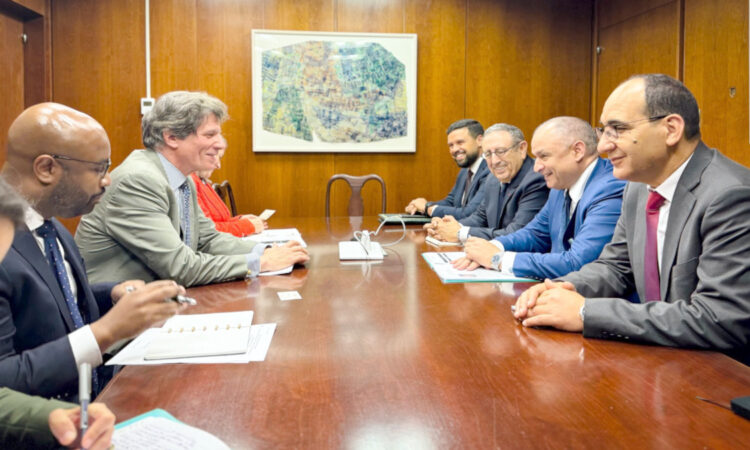
In the framework of the eighth session of the Free Trade Agreement (FTA) committee held in Washington DC, the two countries focused their talks on trade relations in the textile, agricultural and automobile sectors.
The visit, led by the Moroccan Minister of Industry and Trade, Ryad Mezzour, was attended by Morocco’s Ambassador to the United States, Youssef Al-Amrani, along with other Moroccan diplomats. The United States, on the other hand, was attended by the US Deputy Trade Representative for Europe and the Middle East, Bryan Trick.
The understanding is mutual. Keeping the textile and automotive negotiations at the centre was the Moroccan position at the table. Among the common commitments, according to Bryan Trick, are overcoming barriers to economic growth and maintaining bilateral relations between the two states.
In turn, Mezzour clarified that the entry of the United States into Morocco “entails maintaining a special link in the construction of resilient supply chains with the rest of the continent”. Meanwhile, the Moroccan ambassador, Youssef Al-Amrani, clarified that relations are good and stated that Morocco’s position is to “deepen and promote investment”.
Since the entry into force of the FTA between Morocco and the United States, also known as the US-Morocco Free Trade Agreement (USMCA) in 2006, economic and trade relations have increased exponentially.
The signing of the agreement brought with it increased regulatory challenges, but at the same time, new opportunities for cooperation. This is partly due to Morocco’s strategic position and agreements with the EU and powers such as Israel.
Morocco’s advantages from the agreement are mainly threefold: the reduction of tariffs on its products, the attraction of foreign investment (where Morocco is making great efforts, such as the new Investment Charter), and the protection of intellectual property.
For the US economy, it is also a breakthrough to new markets. Relations with Morocco have favoured the African vision of the United States, which is increasingly investing in the continent, partly because of competition with China, which is already the leading investor in Africa.
The partial or total reduction of tariffs on Moroccan products in the US is key to the renewal. Currently, a large part of Moroccan products, especially agricultural products, cannot enter the US market because of the obstacles placed on poultry, vegetables and fruit. As for textiles, the main objective of the search for agreements was to compete with the Asian market.
The achievement of these agreements will encourage private investment and promote equitable growth among the country’s twelve regions. Undoubtedly, the breakthrough in trade relations comes from the Investment Charter. The document laid the foundations for unique growth in Morocco. The establishment of a clear framework for investment has attracted and encouraged much of today’s trade. Most importantly, however, investment protection has been achieved through greatly reduced risk and streamlined bureaucracy.
The establishment of US multinationals on Alawi soil has been a constant in recent years. Regardless of the sector, US companies are seeing how, since the approval of the Investment Charter, opportunities in the North African market are multiplying; for example, in the airline sector we have the involvement of Boeing, which, as a result of its results since 2023, is licensing other companies, especially Moroccan ones, so that they can manufacture official Boeing products.
Relations between Morocco and the United States are not only commercial. As a ‘reliable partner’ for the Americans, Morocco is a major political partner, through decisions such as the recognition of the Moroccan status of Western Sahara. Moreover, in military terms, they collaborate in joint manoeuvres such as the African Lion, where both armies conduct exercises and test their military arsenal.






